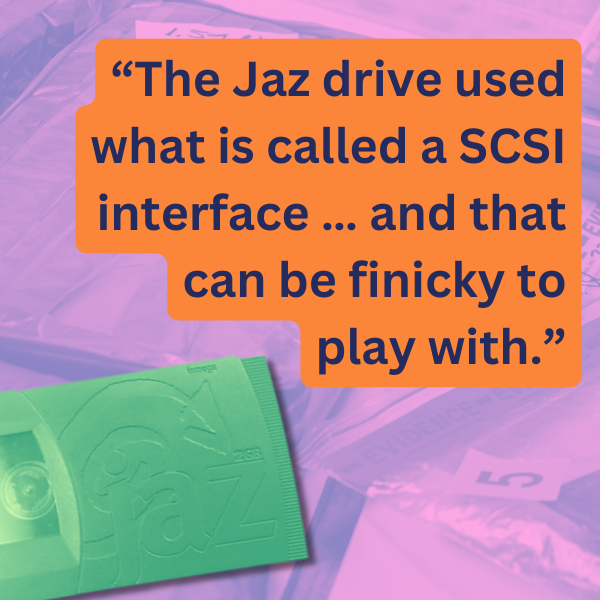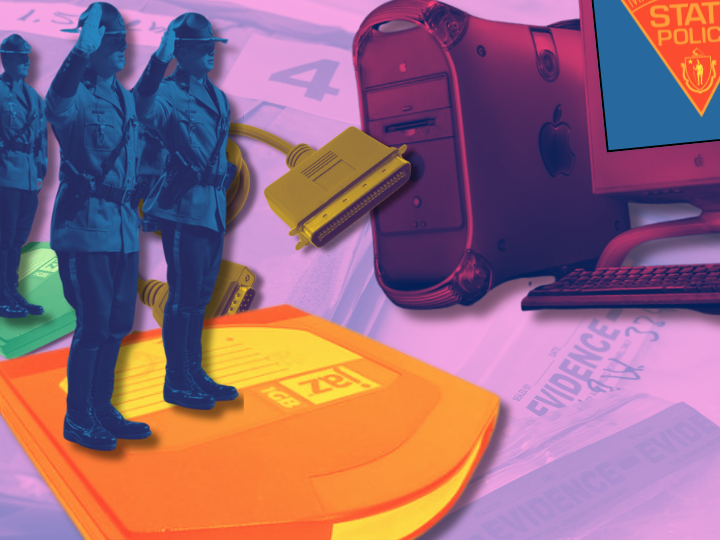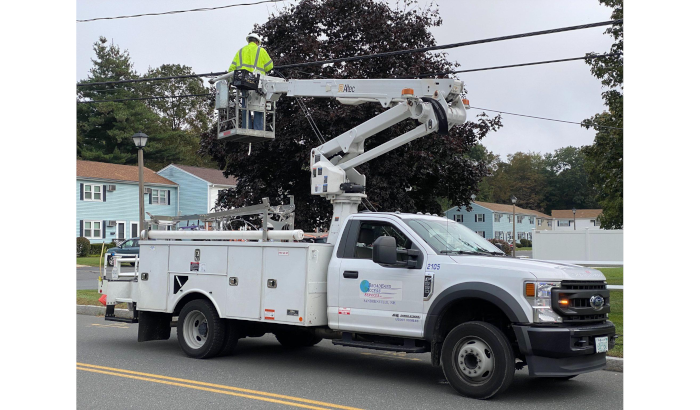The agency’s crime lab needs to extract data from disks that first came on the market in 1996—but what for?
The Massachusetts State Police Crime Lab in Maynard is looking for an expert to help recover “laboratory instrument data” from 30 Jaz drive disks, a technology that has been obsolete since the early 2000s.
The crime lab posted a bid solicitation for an expert to extract the data, according to COMMBUYS, a procurement platform state officials use to alert potential vendors. If you have a Jaz drive in your junk drawer, don’t bother applying; the bid process is an “invitation only opportunity.”
We asked what investigation, if any, they are connected to, or why the lab is having trouble accessing the data on these disks (spelled “discs” in the request for proposals). The MSP did not respond to our questions.
Why the Massachusetts State Police need tech from the ’90s in 2025
According to the bid solicitation, the crime lab has a Jaz drive, which appears to be working, and a Macintosh computer running Mac OS 9.1, which is also working, but the computer “doesn’t see the SCSI-Connected Jaz Drive.”
The disks, which come in cartridge form, are believed to be undamaged. But that operating system dates back to 2001, and the lab seems to be having connectivity issues. In a post-Radio Shack era, the MSP purchasing agent went to the open market “seeking expertise in resolving this issue” of retrieving “laboratory instrument data.”
The nature of the data they want to retrieve is unclear, as is MSP’s reason for trying to extract it. Jon Berryhill, the president of Berryhill Computer Forensics, Inc., said the search could be related to some kind of technology that was creating a significant amount of data in the late ’90s and early 2000s.
“This was the way they chose to store it, and now, for whatever reason, they have become a point of interest for somebody,” said Berryhill, who is an expert on computer crimes. “I kind of assume [it is] for a criminal case, since it’s a state crime lab that’s dealing with them. … But for all I know, it could be something they were doing in-house back then and now they don’t know what to do with it.”

Getting familiar with the ancient Iomega Jaz drive
While Jaz tech hasn’t been in use for decades, it was revolutionary in the mid-’90s, and replaced the once popular Zip drive. The New York Times reported in 1996: “Now you can keep the entire valuable contents of your one-gigabyte hard drive close to your heart, right in your shirt pocket.” Noting the extraordinary “Jaz capacity,” the Times explained, “If you work on graphics or multimedia, you may regularly produce files that clutter your hard drives but exceed even the Zip’s 100-megabyte capacity.”
The 1-gigabyte removable disk cartridge was introduced by Iomega in 1995, and “startled the industry with its breakthrough price of $99,” according to PC Magazine. In 1997, the company began selling 2-gigabyte drives, but stopped making the disks in 2003 when the technology became obsolete.
One reason the lab might have some trouble accessing the cartridges is unfamiliarity. “Basically, they don’t have anybody there with enough grey hairs,” Berryhill said.
He explained that the dated Jaz tech can be difficult to work with: “The thing that’s going to confuse a lot of people is, they were a bit finicky about how you would connect them up to a computer. … The Jaz drive used what is called a SCSI interface … and that can be finicky to play with.”
After we reached out to him for this article, Berryhill said that he contacted the crime lab for more details. “They’re not sure what they’re really asking [for],” he said. “Whether they’re trying to get somebody to read these things for them, or whether they want somebody to basically come into their facility and show them how to do it.”
Berryhill said the task at hand would take him between 10 minutes and an hour per disk. He’d have to dust off his old Jaz drive which is currently in storage, then extract the data in his office. Even if the disks are full, he said the data on them all would fit on a modern thumb drive. Still, Berryhill said it is important for the lab to hire someone who is qualified to handle the potentially sensitive material.
“If these things were part of some criminal case that they’re working on, [then] they want to make sure they get the right people handling it,” Berryhill said.
MSP history of (mis)handling evidence
Though there is nothing to suggest the information on the Jaz disks in question is related to anything unsavory, it’s worth noting that the Massachusetts State Police is an embattled agency on many fronts.
Currently in headlines for the actions of troopers involved with investigating the case against Karen Read for the alleged murder of Boston Police Department Officer John O’Keefe, the agency has endured scandal after scandal, year after year, with its last marquee embarrassment coming out of its laboratories—and blowing up big enough to warrant a Netflix documentary, How to Fix a Drug Scandal.
The MSP labs have been the subject of several scandals, one of which resulted in authorities dismissing more than 15,000 of drug convictions. Annie Dookhan, who was a chemist at the Hinton crime lab in Jamaica Plain, served three years in prison after admitting to tampering with evidence, forging test results, and lying about it after she was exposed in 2012. Sonja Farak, a chemist who worked at two different MSP labs, pleaded guilty in 2014 to tampering with evidence and drug theft charges.
For those errors, the commonwealth paid more than $13 million settling class-action lawsuits with more than 30,000 people who were wrongfully convicted due to flawed tests. That’s in addition to more than $30 million spent on managing the fallout.
Regarding the current task at hand at the state’s Maynard lab, it appears that by seeking outside help, state police are taking the right precautions.
“You don’t want to take something that’s going to be evidence in a criminal case and let your run of the mill IT guy mess with it,” Berryhill said, “because they don’t know how to deal with it from the standpoint of handling evidence.”
This article is syndicated by the MassWire news service of the Boston Institute for Nonprofit Journalism. If you want to see more reporting like this, make a contribution at givetobinj.org.




